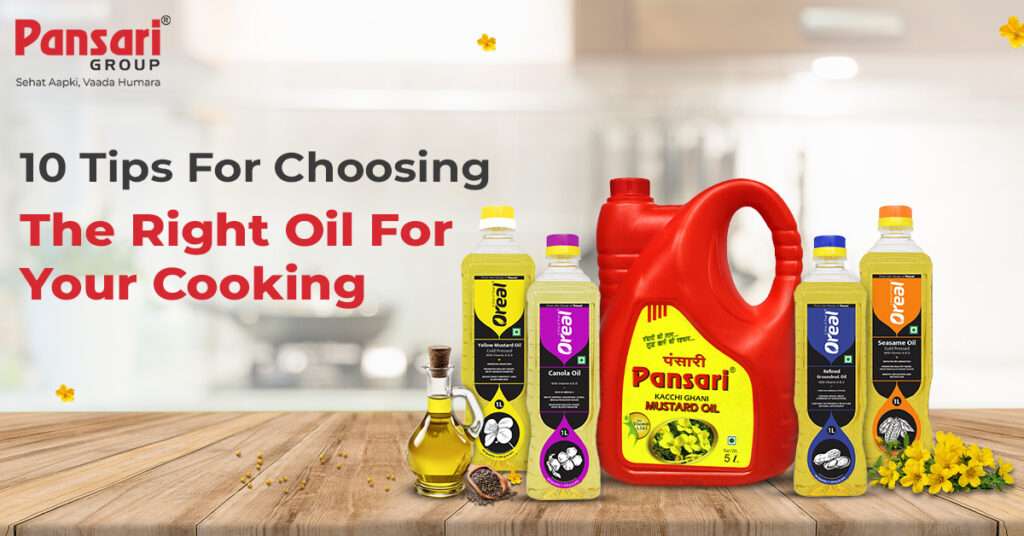In the search for a healthy lifestyle, the selection of cooking oil plays an important role. Whether you’re frying, sautéing, or dressing a salad, the oil you use can significantly impact both the flavour and nutritional value of your meals.
Here at Pansari Group India, we understand the importance of choosing the best cooking oil for your cooking needs. From the best cooking oil for heart health to the best mustard oil for traditional Indian recipes, understanding the different types and their benefits can transform your cooking experience.
Here are ten essential tips to help you select the right oil for your needs. This Blog will help you navigate the number of options and make an informed choice that benefits your health and enhances your dishes.
1. Evaluate the Nutritional Profile
Different oils offer varied nutritional benefits. Various types of oil, known as the best cooking oil for heart health, are rich in monounsaturated fats and antioxidants.
Mustard oil, another heart-friendly option, contains omega-3 and omega-6 fatty acids. Always check the nutritional label before selecting an oil to ensure it fits your dietary needs.
2. Flavor and Aroma
Your food’s flavor and aroma can be enhanced or overpowered by the oil’s flavor. For instance, the strong flavor of mustard oil is ideal for Indian cuisine, making it the best mustard oil for cooking traditional dishes.
Conversely, neutral oils like canola or sunflower oil are versatile and blend seamlessly with various ingredients.
3. Health Benefits
When considering the best cooking oil, prioritize those with proven health benefits. Oils that are, particularly extra virgin, are lauded for their heart-protective properties.
Mustard oil is also gaining recognition for its potential to reduce inflammation and improve cardiovascular health. Always choose oils that support your overall well-being.
4. Versatility in Cooking
Some oils are more versatile than others. For instance, good quality oils can be used for sautéing, baking, and even as a salad dressing.
Mustard oil, with its distinctive flavor, is perfect for specific regional dishes but might not be suitable for all cooking methods. Opt for oils that suit a variety of culinary techniques.
5. Cold-Pressed vs. Refined
Oils that are cold-pressed are extracted without heat, preserving their natural nutrients and flavors. These oils, such as cold-pressed mustard oil, are ideal for dressings and low-heat cooking.
Refined oils, processed to remove impurities, have a higher smoke point and are better suited for frying and high-heat cooking.
6. Sustainability and Sourcing
Consider the environmental impact of your oil choices. Look for oils sourced sustainably and produced by ethical brands.
At Pansari Group India, we are committed to providing oils that are not only good for your health but also for the planet.
7. Shelf Life and Storage
Oils with a high content of polyunsaturated fats, like flaxseed oil, have a shorter shelf life and should be stored in the refrigerator.
Oils with more stable fats, such as mustard oil, can be kept at room temperature but away from direct sunlight. In order to preserve the oil’s quality and nutritional value, it must be stored properly.
8. Cost-Effectiveness
While high-quality oils might be pricier, they often provide better health benefits and flavor. Investing in the best cooking oil can enhance your meals and contribute to your long-term health.
Balance your budget with the quality and nutritional benefits of the oil.
9. Personal Preferences and Dietary Needs
Ultimately, the best cooking oil is one that fits your personal taste and dietary requirements. Whether you prefer the robust flavor of mustard oil for cooking or the mild taste of canola oil, choose an oil that you enjoy and that complements your lifestyle.
10. Assess the Fat Composition
When choosing the best cooking oil, it’s essential to understand the types of fats they contain. Oils are composed of varying ratios of saturated, monounsaturated, and polyunsaturated fats.
Saturated fats, found in coconut oil and palm oil, are solid at room temperature and can withstand high-heat cooking. Monounsaturated fats, like those in mustard oil for cooking, are liquid at room temperature and are excellent for heart health.
Polyunsaturated fats, present in oils like sunflower and flaxseed oil, are also liquid at room temperature but are less stable at high temperatures. Balancing these fats in your diet can contribute to overall health, making it crucial to choose an oil that fits your cooking method and nutritional needs.
Conclusion
Selecting the right cooking oil is a crucial decision that affects both the flavor of your food and your health. By considering factors such as smoke point, nutritional profile, and flavor, you can make an informed choice.
At Pansari Group India, we offer a wide range of high-quality oils to meet your Food needs. From the best cooking oil for heart health to the best mustard oil for traditional recipes, we have you covered. Choose wisely, cook healthily, and enjoy the rich flavors that the right oil can bring to your dishes.

